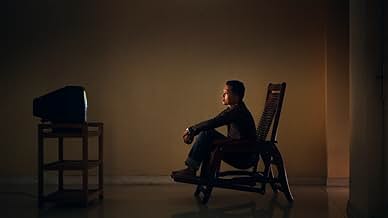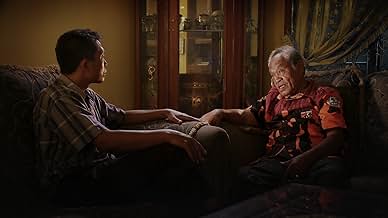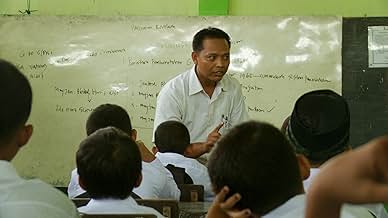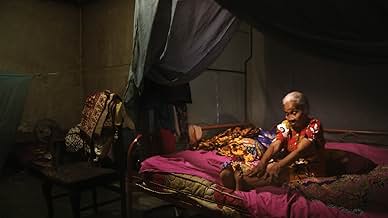Una familia que sobrevivió al genocidio en Indonesia se enfrenta a los hombres que mataron a uno de sus hermanos.Una familia que sobrevivió al genocidio en Indonesia se enfrenta a los hombres que mataron a uno de sus hermanos.Una familia que sobrevivió al genocidio en Indonesia se enfrenta a los hombres que mataron a uno de sus hermanos.
- Nominado a 1 premio Óscar
- 48 premios ganados y 45 nominaciones en total
- Self - former leader of death squad
- (material de archivo)
- Self
- (voz)
- (as Josh)
- Self - Sprecher
- (voz)
- (as Achim Schülke)
- Self - reporter, NBC News
- (material de archivo)
Opiniones destacadas
His second film, "The Look of Silence", coupled with his "The Act of Killing" has created a sea- change in the Indonesian truth, justice and reconciliation movement. Forcing new laws to be written and putting the government in a defensive position against the nation's media.
But Oppenheimer is more than an activist. He's an artist. His films are contemplative, playful and quietly confrontational. His visual attack is succinct, his marriage of form and theme is flawless and his moral intent is thunderous.
Where "Act of Killing" was concerned with a larger study of post-massacre Indonesia, "Look of Silence" chooses a more intimate landscape. Geographically, emotionally and cinematically it is regional. Concerned with a single killing, the men who did it – directly and indirectly - the family it affected and the small village that has lived with questions about other killings like it for fifty years. Where "Act of Killing" lived in absurdist grand cinema, "Look of Silence" exists in tight close-ups of the perpetrators, survivors and truth-seekers. More than anything, more than words, their faces tell the story. So much happens behind the eyes, around the corners of the mouth, in unspoken glances. The horror, doubt, guilt and seemingly impossible reconciliation stirs below the surface. For all the cinematic flex of "Act of Killing", this contained take on the same material, seems more haunted and human.
The star of the film, Adi the eyewear peddler, pursues this mission with intelligence and courage. We meet his family. His happy playful daughter, his thoughtful son, his cautious loving wife, his ageless mother (probably the most engaging character captured on film this year), his wisp of an ancient father, and his memory of a murdered brother, looming over everything. From them he finds the courage to question murderer after murderer face-to-face. The combination of his profession as an optometrist with his quest to seek truth would seem heavy-handed if it were fiction, but nothing here is inauthentic. In showing all of Adi's family, from the fresh and young, to the spent and dying, we see the full arc of life.
Lastly, the film makes a glancing but firm indictment against the American anti-Communist fervor that fed into - and the American corporations that profited from - these killings. It gives strong evidence that the Cold War, the war of ideology and the murder of millions, allowed for, and was even fought for, Western corporate dominance in places like this. And here the grinding up of human beings for profit in this situation is undeniable. Oppenheimer wants to make sure no one involved gets off without having to face, if not their own role in the massacre of millions, then at the very least, their culture's.
And so it goes, the people (wives, mothers, daughters, sons, fathers, husbands), the silence, the haunted jungle hum that fills most of the auditory space in the film, the great and overwhelming significance of it all everything pools together to show us something words alone can't manage. Something about how a horror can be so great that its impact can loom over generations. About living with debilitating fear of those who have claimed power over you through violence. About the most nightmarish tendencies in humanity, and our courageous capacity to overcome the worst of ourselves. About just how difficult it is to look into the eyes of a killer and say, "I know what you did."
And more profoundly, more frighteningly "I know you."
The two films work well together, Act of Killing being more overview and focusing on the killers and the political structure/mob rule that is still in power. Act of Killing doesn't particularly explore how they got away with genocide (why the world turned a blind eye), but this is alluded to carefully and specifically in Look of Silence.
I could write so much because the two films together have provoked in me a profound perspective on human horror, which has gripped me most recently with what we see on the news with ISIS (Paris Masacre).
What are human beings capable of, and why is an individual able to make such choices? What are the structures that facilitate the most grotesque of human acts of wickedness upon one another. Do we all contain wickedness, does a killer lurk inside us all? Does fear itself propel the killers - kill or be killed? Are we (cells in the human organism) enacting our worst imaginable terror, excising evil, I kill therefore I am?
Josh Oppenheimer, I applaud your work. The sensitivity and attention to the finest detail employed in your work is, for me, beyond words. The cinematography, colours you choose, balance in composition. Even the subtitles were easy to read. Beautiful lingering pauses. You said of one still scene, a bridge, pale green, a river bank; you have no words to describe how this scene makes you feel, what the scene says. For me this scene (in LoS) is terrifyingly beautiful, sad, the weight of recent history hanging there in the stillness. Embodying the sadness and fear. I love that still scene.
Superb, I do not have the words to describe what your films say to me... I will think about them for a long long time, and watch them again.
After my viewing of it finished at 7 a.m., I was lowering myself into a warm bathtub when suddenly I became haunted by the feeling that headless bodies were floating past me as if I were in the Snake River where the corpses had been dumped. Indeed, I couldn't put the film out of my head the rest of the day, and haven't since. The film follows an Indonesian man named Adi Runkun whose brother had been brutally murdered in the 1965 purge of 'communists' as he confronts, in the present day and under the pretext of dispensing eye exams, the men who had carried out the killings (and who had boasted and joked about the carnage in "The Act of Killing"). We also see Adi's humane care-taking of his nearly dead father whom he bathes and consoles, and other family members who have had to live among his brother's murderers for decades. What makes this film so effective is how Adi refuses to display any emotion at the killers while the director continues to portray them as human beings rather than monsters (no revenge film this), but Adi's silent stare keeps burning into their souls as they squirm uncomfortably, stubbornly offering lame excuses while refusing any expressions of regret. By this method Oppenheimer makes the film much more of an iconic document of man's inhumanity to man, forcing viewers to contemplate parallels in history, most especially the Nazis who perpetrated the Holocaust in Hitler's Germany.
There is nothing easy about this film, yet it is one of the few films you must not miss if you have a heart that pumps blood.
¿Sabías que…?
- TriviaAdi and his family moved thousands of kilometers away to the other side of the country, out from under the shadow of the perpetrators who are still powerful situation in North Sumatra.
- Citas
Himself, brother of murdered Ramli Rukun: Tell me about that madness.
Himself, former leader the village death squad: Some killed so many people who have gone mad. A man climbed a palm tree, every morning, to call for prayer. Killed too many people. There is only one way to avoid it. Drink the blood or go crazy. But if you drink blood, you can do anything.
Himself, brother of murdered Ramli Rukun: [Testing the eyeglasses] What do you think...
Himself, former leader the village death squad: Salty and sweet. The human blood.
Himself, brother of murdered Ramli Rukun: Pardon?
Himself, former leader the village death squad: Human blood is salty and sweet. I know from experience.
- ConexionesEdited into P.O.V.: The Look of Silence (2016)
- Bandas sonorasLukisan Malam
music by E. Sambayon & lyrics by Sakti Alamsyah
performed by Sam Saimun
courtesy of Irama Records
Selecciones populares
- How long is The Look of Silence?Con tecnología de Alexa
Detalles
- Fecha de lanzamiento
- Países de origen
- Sitios oficiales
- Idioma
- También se conoce como
- Sessizliğin Bakışı
- Locaciones de filmación
- Productoras
- Ver más créditos de la compañía en IMDbPro
Taquilla
- Total en EE. UU. y Canadá
- USD 109,089
- Fin de semana de estreno en EE. UU. y Canadá
- USD 6,616
- 19 jul 2015
- Total a nivel mundial
- USD 157,857
- Tiempo de ejecución1 hora 43 minutos
- Color
Contribuir a esta página




























